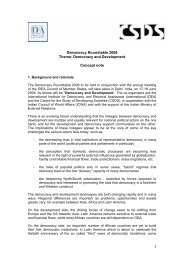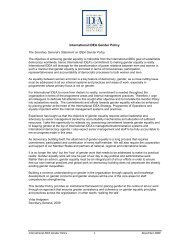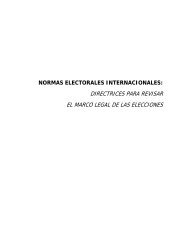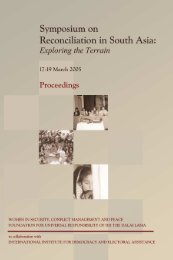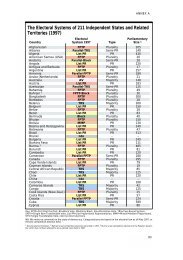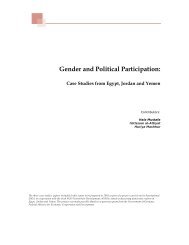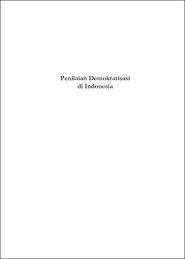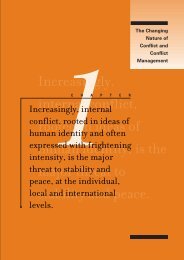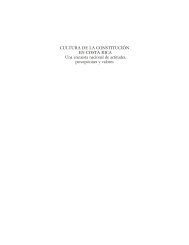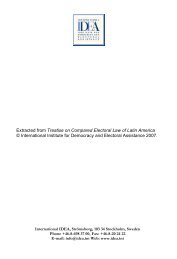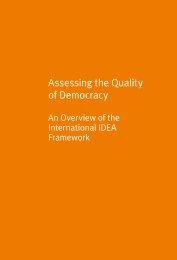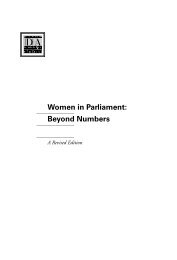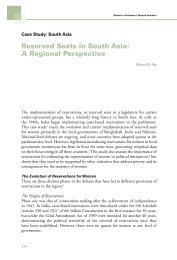The Role of State Constitutions in Protecting ... - International IDEA
The Role of State Constitutions in Protecting ... - International IDEA
The Role of State Constitutions in Protecting ... - International IDEA
You also want an ePaper? Increase the reach of your titles
YUMPU automatically turns print PDFs into web optimized ePapers that Google loves.
After the adoption <strong>of</strong> the constitution, two more bodies have been added to the<br />
list <strong>of</strong> watchdogs:<br />
◆ National Commission for M<strong>in</strong>orities: Constituted by the government <strong>of</strong><br />
India <strong>in</strong> 1978. <strong>The</strong> National Commission for M<strong>in</strong>orities, a statutory body,<br />
was set up under <strong>The</strong> National Commission for M<strong>in</strong>orities Act, 1992.<br />
◆ National Human Rights Commission: Constituted under <strong>The</strong> Protection<br />
<strong>of</strong> Human Rights Act, 1993, an Act to provide for the constitution <strong>of</strong> a<br />
National Human Rights Commission.<br />
Special provisions for different areas/states<br />
<strong>The</strong> Indian constitution is full <strong>of</strong> special provisions for special areas. Of these two<br />
merit special attention:<br />
<strong>The</strong> constitution allows for the formation <strong>of</strong> Autonomous Councils to protect the<br />
rights <strong>of</strong> the m<strong>in</strong>orities with<strong>in</strong> the state. This provision has been used extensively<br />
<strong>in</strong> the north eastern parts <strong>of</strong> the country and has provided modicum <strong>of</strong> self-rule<br />
to these communities.<br />
Furthermore, there are many provisions <strong>in</strong> the constitution exempt<strong>in</strong>g some area<br />
or the other from the application <strong>of</strong> central laws. <strong>The</strong> most famous <strong>of</strong> these is the<br />
Article 370 that exempts the state <strong>of</strong> Jammu and Kashmir from the ambit <strong>of</strong><br />
federal laws. It says:<br />
(a) the power <strong>of</strong> Parliament to make laws for the said <strong>State</strong> shall be limited to-<br />
(i) those matters <strong>in</strong> the Union list and the Concurrent list which, <strong>in</strong><br />
consultation with the Government <strong>of</strong> the <strong>State</strong>, are declared by the<br />
President to correspond to matters specified <strong>in</strong> the Instrument <strong>of</strong> accession<br />
<strong>of</strong> the <strong>State</strong> to the Dom<strong>in</strong>ion Legislature may make laws for that <strong>State</strong>;<br />
and<br />
(ii) such other matters <strong>in</strong> the said Lists, as, with the concurrence <strong>of</strong> the<br />
Government <strong>of</strong> the <strong>State</strong>, the President may by order specify.”<br />
It needs to be reiterated that there are similar provisions <strong>in</strong> the constitution for a<br />
number <strong>of</strong> other states.<br />
To conclude it is worth emphasiz<strong>in</strong>g that beyond constitutional design and<br />
<strong>in</strong>stitutional <strong>in</strong>terplay, politics has played a role as the unify<strong>in</strong>g force. For<br />
<strong>in</strong>stance, the Indian National Congress created a broad social coalition. <strong>The</strong><br />
politicization <strong>of</strong> social cleavages has had an impact on federalism as has the<br />
regional parties <strong>in</strong> deepen<strong>in</strong>g federalism. India has adopted the salad bowl versus<br />
the melt<strong>in</strong>g pot model <strong>of</strong> national unity and it is a model that has served it well.<br />
28



